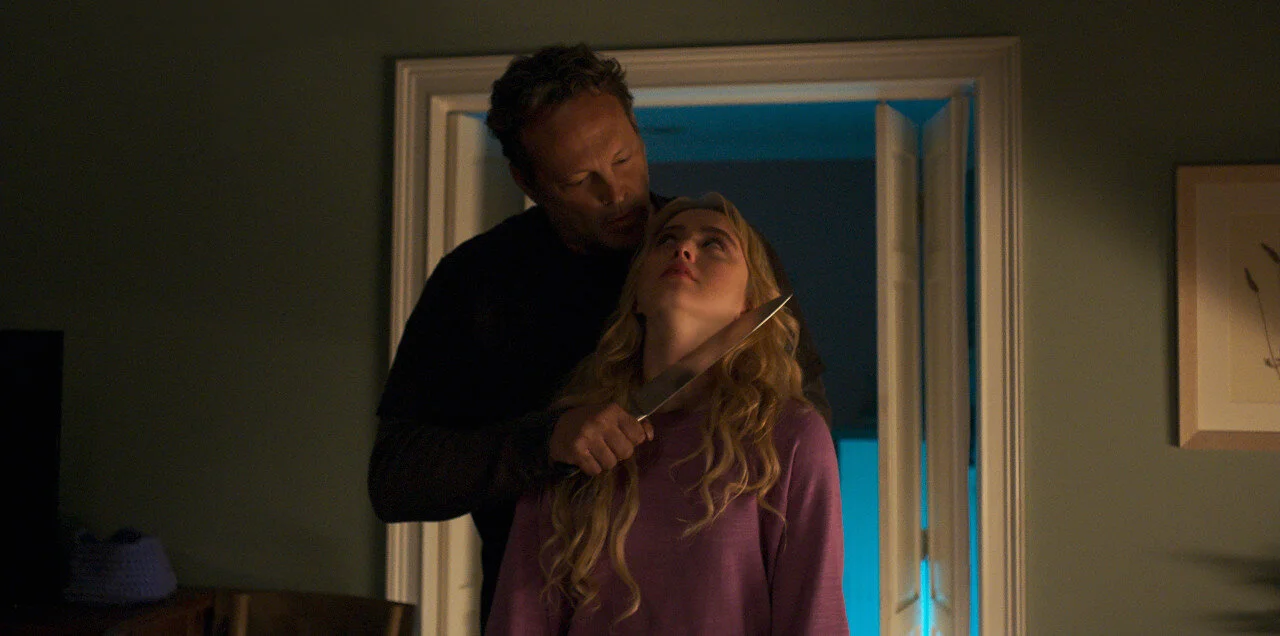Freaky: Body-Swapping Slasher Flick High on Concept, Meh on Execution
By Thom Ernst
Rating: B
Freaky jumps to the top of a long line of genre films with one of the best horror/comedy concepts since Shaun of the Dead (2004).
The day the idea came to writer/director Christopher Landon and co-writer Michael Kennedy — to combine the body-switching narrative of Freaky Friday (1976) with the slasher element of Friday the 13th (1980) — they needn’t do anything but bathe in the glory of their brilliance. But though the concept comes loaded with possibilities, Landon and Kennedy still had the task of fleshing out the idea into a feature film.
For the most part, they succeed. Freaky is an entertaining plunge into a satirical world of teenage slasher films, but one that falls short of its full potential. The problem with high-concept ideas is that the expectation for something brilliant heats up long before the popcorn is even ready to be salted.
But director Landon knows a thing or two about audience expectations and the fine art of making a good popcorn thriller. His Happy Death Day (2017), which he wrote and directed, and Happy Death Day 2 U (2019), which he wrote the screenplay but stepped down from directing, are also high-concept hybrid films, pairing a horror-mystery Groundhog Day (1993).
But where Happy Death Day and its sequel are light on horror and big on charm, Freaky goes full-tilt gore, tossing aside charm for more rudimentary humour playing on double-entendres and explicit sexual references.
It works as Landon intends it to work, but on a much different level from his previous films. Happy Death Day is something of a family-friendly entry-level horror film for preteens to watch with their parents. But Freaky demolishes any hope of good-natured accessibility with an opening scene of deliciously explicit carnage.
Kathryn Newton (Big Little Lies) plays Millie, a teenage girl from a low-income family whose bargain-bin wardrobe and introverted nature make her an easy target for school bullies—both student and teacher. But each degrading moment Millie experiences is merely a set-up for karma to step in with brutal comeuppance.
Millie is in her senior year at Blissful high school. But life is anything but blissful. Her mother is lost in grief and alcohol after the death of Millie’s father. Meanwhile, unsubstantiated rumours of the Blissful Butcher stalking the town suddenly prove true.
PROUDLY SUPPORTS ORIGINAL-CIN
Vince Vaughn is the Blissful Butcher. He is, by measures, your average serial killer but with cunning and strength beyond the reach of most humans. Aside from sheer brute masculine force, no reason is given for his strength.
However, he does get some supernatural backing when, after a few magnificent kills, he comes upon a sacred dagger that allows him to switch bodies with one of his victims. Millie becomes that victim.
Reasons why this body-swapping happens is irrelevant given that no rational explanation is possible. It has something to do with the dagger and an Aztec curse. But if you don’t buy into the film’s hocus-pocus logic, you need not venture further—thinking will ruin the experience.
Much of the film’s delight comes from watching the two main actors, Newton and Vaughn, switching roles. Newton plays Vaughn’s serial killer trapped in Millie’s body with slow methodic movements. Her head tilts slightly down while her eyes peer up in a menacing glare.
Vaughn, who resurrects his Norman Bates character for the role, is initially amusing as a teenage girl. He adheres to whatever mannerisms Millie has, as established earlier by Newton. But as he/she—and a reference to gender identity does come into play later in the film—becomes more acquainted with his/her new body, the humour starts to give way to something less identifiable.
Without evidence of Millie’s strength of character, Vaughn’s frightened final girl routine seems disingenuous to the role; a mocking interpretation of a man’s idea of how a teenage girl acts. Yes, she’s an outcast, but she is capable of recognizing her tormentors as frauds and of forming strong bonds with her outsider friends.
And though there is no specific intent to ridicule, Vaughn’s assumed display of femininity is even more uncomfortable when seen alongside Millie’s flamboyant gay friend, Josh (Misha Osherovich).
I think Landon would like to believe Freaky to be a story about female empowerment. It is, but only if female empowerment is the ability to be equally as violent as their male counterpart. And he fails to reach beyond the tiresome notion that shy, introverted girls are saved from obscurity by transforming into sexy, jaw-dropping vixens.
Are these just tiny glitches in an otherwise wholly entertaining film? Perhaps, but once recognized, these glitches are impossible to ignore.
Not many are likely to be put off by Vaughn’s performance. Many are more likely to see Vaughn’s routine as the sole reason to see the film. For roles of this type, I prefer Jack Black’s turn in Jumanji: Welcome to the Jungle (2017).
The difference is that Black isn’t playing the mannerisms of a teenage girl for laughs; he instead plays the frustrations of a teenage girl trapped in the unyielding inconvenience of middle-aged man’s body. It’s not as gory, but a lot funnier.
Freaky. Directed by Christopher Landon. Starring Kathryn Newton, Vince Vaughn, and Misha Osherovich. Opens at selected theatres November 13.



